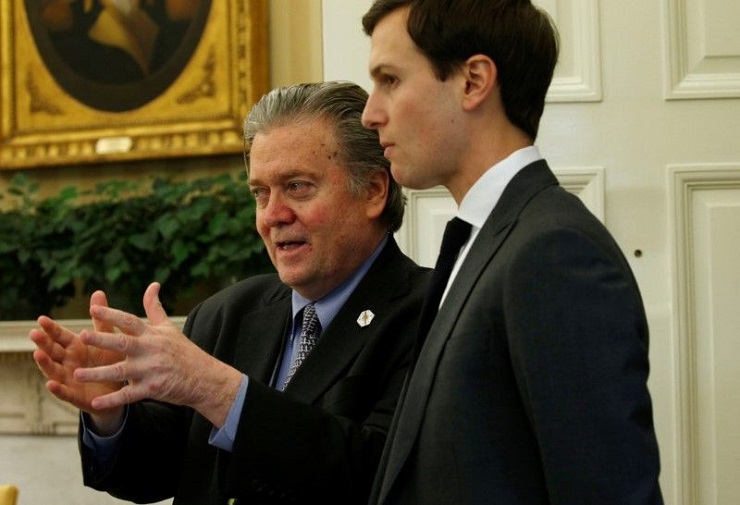During the long twentieth century, the United States twice rescued Europe from its own follies — to its benefit, and this year’s dramatic shift to the right in the European Parliamentary elections is partly credited to a long campaign by the American Deus ex-Machina Steve Bannon. Overlooked, however, are the US wars in Africa and the Middle East that caused tens of thousands to seek safer lives in white, largely Christian Europe. During the long twentieth century, the Americans twice rescued Europe from its own follies — to its benefit. While long a potential battlefield between two nuclear powers, Europe is still the prize over which the US and Russia vie for influence. as it struggles to come to terms with the loss of Caucasian dominance in a world represented by the infinite varieties of honey. and Sunday’s vote shows that its ‘graduation’ to competitive status continued to benefit Washington. Whether or not switching superpower oversight would make the Eurasian peninsula a better place to live remains to be seen.
Russia’s plans for a “Big Eurasia” which will link the European Union to the Eurasian Economic Union via China’s New Silk Road, a vast network of highway, track and port projects, will turn the continent into a single economic space connected to North and East Africa and the Pacific islands, including Australia and New Zealand. .
This community will be very different from the North Atlantic Treaty Alliance, which allows the United States to claim exclusive dominance of the Southern American hemisphere via the Monroe Doctrine while meddling uninvited across the globe (During a recent meeting between the US’s Pompeo and Russia’s Lavrov, when the former asserted US exclusive power over the entire Western Hemisphere, Lavrov responded “Then what are you doing in Ukraine which is in the Eastern hemisphere?”)
Aside from the intimidating presence of the two nuclear-armed powers that have haggled over it for a century, any wishful thinking that a European entity is capable of fending for itself and doing right by its people foundered in the recent election. For all its noble intentions, the European left continues to be no more powerful than it was in the nineteen-thirties — or the Golden Age that led to World War I. Even the big leftish French daily, Liberation recognized a sign of decline in the fact that 34 parties competed, rather than a vibrant democracy.
The fact that President Emanuel Macron, who has likened himself to Jupiter, came in second to Marine Le Pen’s party, dovetails with the overall frustration with the left illustrated by the rise of the Gilets Jaunes, and the appearance of tiny new parties, only six of which entered a legislature that remains more or less equally divided between center right and center left. Although turnout topped fifty percent, the largest since 1984, the success of the far right, though expected, is scarcely compensated for by the greens going from 52 seats to 71.
And given the central place of immigration in the EU, it matters that France and Italy disagree over the standoff between two Libyan leaders.
Although Europe appears to take climate change more seriously than America, and has the third largest economy after China and the US, seventy years of US oversight have only exacerbated a thousand year competition over small pieces of real estate by incompatible tribes. We can speculate how and why this happened, however, it would change nothing to “the facts on the ground”.
The French and Italians have just enough in common to feel like first cousins, and while twice in the twentieth century Italy sided with Germany against France and Britain, the latest election finds the far-right parties of all three countries tightly aligned. Meanwhile, the center-right Macron-Merkel duo which broke with centuries of strife to jointly lead the European Union, is threatened by competition over who will head the powerful EU Commission. After fifty years it may be time for a German to lead, the question being whether the parliament should vote on it, or it be settled in backrooms between national governments.
One Italian left-winger commenting on the fact that from Finland to Portugal, not one far right party did poorly commented : “Maybe it couldn’t have been otherwise, on this tired, old continent, fearful and bereft of confidence. We were supposed to be the cradle of twenty-first century knowledge, build a new world without borders, and we end up building walls to avoid the death of our demography, our economy and our politics from chaos created by others.
Meanwhile, the right’s acknowledged leader, Italy’s Matteo Salvini, immediately demanded that the EU drop sanctions against Russia, following that country’s reinstatement into the Council of Europe, as the populist Finns Party advocates for Finland to leave Europe’s Schengen zone and form a visa-free regime with Russia.
Deena Stryker is an international expert, author and journalist that has been at the forefront of international politics for over thirty years. She can be reached at Otherjones. Especially for the online magazine “New Eastern Outlook”.

